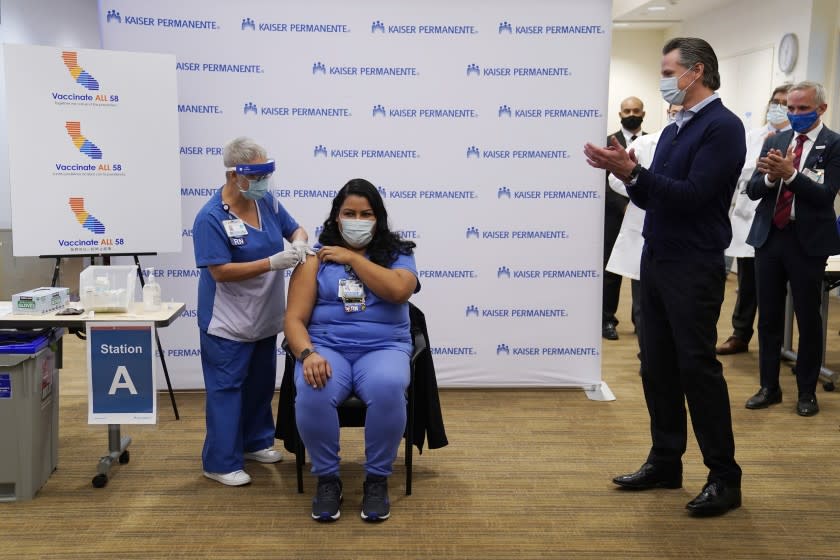After lagging start, Newsom promises 1 million more California COVID-19 vaccinations in nine days

- Oops!Something went wrong.Please try again later.
Gov. Gavin Newsom set an ambitious target of vaccinating an additional 1 million people against COVID-19 over the next nine days, but offered few new details in Friday's budget proposal indicating how the state would spend the estimated $372 million he says is needed to improve vaccine rates.
Newsom said the state is ramping up efforts to ensure those who qualify for a COVID-19 vaccine are able to get them quickly, admitting the state's effort to distribute the lifesaving supplies has been "not good enough." Though California has received more than 2 million doses of vaccine, as of Friday less than a third had been administered to the frontline healthcare workers and residents at nursing homes and other long-term care facilities who are eligible in the first round of inoculations.
"I would expect — and you should expect — that we are going to see a substantially higher number of vaccines administered in the coming days and coming weeks," said Newsom, later adding, "Hold me accountable."
The state's effort to quickly ramp up the number of people vaccinated against the deadly coronavirus comes as the California Hospital Assn. said Friday that the surging infection rates are expected to result in a tsunami of patients needing care at hospitals that are already stretched to their limit.
The state eased restrictions on who currently qualifies for vaccinations to help speed up the rate at which local health departments and providers administer the Pfizer-BioNTech and Moderna vaccines, a process that was created to ensure the well-off and well-connected can't jump to the front of the line. The state's new guidelines allow for vaccines to be offered to those in other lower-tier groups, such as teachers, child care workers and people over the age of 75, if there is a risk of the vaccine expiring.
Despite the immense focus last year on swift development of a vaccine, distribution has been slower than expected across the United States. Regulations at the federal, state and local levels on how to prioritize those who will first be vaccinated have added to delays in California. The state's rollout has also been hampered in part by technical problems with a software program used to coordinate vaccine distribution, local and state health officials say.
On Friday, Newsom proposed spending $372 million to improve vaccination efforts, with that money loosely earmarked for a new vaccine management system, which is expected to launch next week, increasing distribution supplies and creating a public education campaign to counter vaccine hesitancy. Although those funds are included in the budget proposal that, if approved by legislators, wouldn't take effect until later this year, state officials said Friday that the governor could more quickly spend funds under emergency operations rules that do not require legislative approval.
Newsom defended the state's regimented prioritization of who can receive the vaccine, saying that a shortage is inevitable amid worldwide demand for vaccines and the focus should remain on ensuring groups with the most pressing needs are first in line.
"There is this false pretense that somehow the vaccines are plentiful when they're not," Newsom said.
However, Newsom said it's critical that the state put the supply it has on hand in the arms of those who need it.
California is currently facing a massive surge in COVID-19 cases, with hospitals stretched so thin that some are preparing to ration care. Critically ill patients are waiting days for available intensive care beds in Southern California and the San Joaquin Valley.
Carmela Coyle, president of the California Hospital Assn., said Friday that there are 23,000 people hospitalized with COVID-19 throughout the state, with another 15,000 expected to be hospitalized over the next 10 days.
"Our greatest challenge, as we all know, is the supply of that vaccine," Coyle said.
This story originally appeared in Los Angeles Times.

